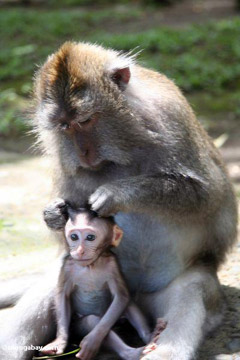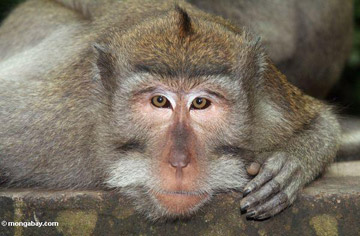Wildlife tourism can be detrimental to monkeys
Wildlife tourism can be detrimental to monkeys
mongabay.com
July 15, 2007
Tourism is causing changes in primate behavior and may be increasing infant mortality and the transmission of disease, reports a study published in the October edition of the International Journal of Primatology.
The 19-year study, “Primate Tourism, Range Restriction and Infant Risk Among Macaca thibetana at Mt. Huangshan, China”, adds to a growing body of work that suggests some forms of wildlife tourism are detrimental to primate populations, facilitating disease transmission, disrupting social behavior, and causing habitat destruction.
Studying Tibetan macaques in the Mt. Huangshan Scenic Area in China’s Anhui province, researchers led by University at Buffalo anthropologist Carol Berman documented changes in infant mortality due to adult aggression in the presence of tourists. Tourists sometimes feed monkeys, triggered shifts in social structure and relationships between monkeys competing for handouts.

|
“Infant mortality rates during the management years were significantly higher than they were in the years before management began and also in the year in which it was suspended,” said Berman. “After management began, we observed serious attacks on infants shortly before they were found dead and a large proportion of infant corpses had bite wounds. Typically, infants were wounded after aggression broke out among adults in the provisioning area used for tourist viewing, and adult aggression rates in the provisioning area were positively correlated with infant mortality over time. ”
“Overhabituation and hyperaggression often result in changes in the primates’ habitat activity patterns and communicative behavior. This in turn can affect predator-prey relationships, intergroup relationships, diet or social development,” she continued. “The strongest reason for caution involves disease transmission because close contact has been blamed for outbreaks of disease among monkeys, great apes and humans.”
“In addition to infant death, disease transmission and the disruptive consequences on their activity, relationships and social development, primate tourism also may contribute to habitat destruction, particularly when tourism demands result in the housing and feeding of tourists within the normal primate habitat.”
Similar results have been found in other parts of the world, including southeast Asia, East and West Africa, Madagascar, and Central America.
Berman says that it is possible to make wildlife tourism a positive for primate conservation, but that planning and management is required.
 Macaque in Indonesia. Photo by Rhett A. Butler |
“Primate tourism has been praised for its potential to achieve conservation goals and financial and educational benefits for local communities, but there has been little research about its impact on the primate groups themselves, which is why we undertook this evaluation,” Berman explained. “We would like to believe that primate tourism can be beneficial to both human economic and conservation interests, but it is imperative that we understand which specific practices serve those ends and which are counterproductive.”
Consuel Ionica of the University at Buffalo; Jinhua Li and Huabao Yin of Anhui University in China, and Hideshi Ogawa of Chukyo University in Japan also participated in the study.
Related articles
Dancing monkeys could be a risk to your health. Some urban performing monkeys in Indonesia are carrying several retroviruses that are capable of infecting people, according to a new study led by University of Washington researchers. The results indicate that contact with performing monkeys, which is common in many Asian countries, could represent a little-known path for viruses to jump the species barrier from monkeys to humans and eventually cause human disease. Performing monkeys are animals that are trained to produce tricks in public.
Viruses can jump primate-human species barrier, researchers warn. Viruses that jump the species barrier between monkeys and humans can harm both people and animals, and we should take steps to reduce the risk of virus transmission. That’s the message running through the September issue of the American Journal of Primatology, a special issue on disease risk analysis edited by a primate expert at the University of Washington.
